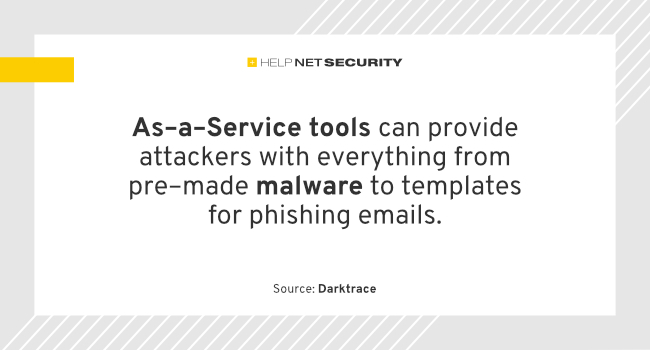As-a-Service tools empower criminals with limited tech skills
As-a-service attacks continue to dominate the threat landscape, with Malware-as-a-Service (MaaS) and Ransomware-as-a-Service (RaaS) tools making up the majority of malicious tools in use by attackers, according to Darktrace.

Cybercriminals exploit as-a-Service tools
As-a-Service tools can provide attackers with everything from pre-made malware to templates for phishing emails, payment processing systems and even helplines to enable criminals to mount attacks with limited technical knowledge.
The most common as-a-Service tools Darktrace saw in use from July to December 2023 were:
- Malware loaders (77% of investigated threats), which can deliver and execute other forms of malware and enable attackers to repeatedly target affected networks.
- Cryptominers (52% of investigated threats), which use an infected device to mine for cryptocurrency.
- Botnets (39% of investigated threats) enrol users in wider networks of infected devices, which attackers then leverage in larger-scale attacks on other targets.
- Information-stealing malware (36% of investigated threats), malicious software like spyware or worms, designed to secretly access and collect sensitive data from a victim’s computer or network.
- Proxy botnets (15% of investigated threats), more sophisticated botnets that use proxies to hide the true source of their activity.
Phishing threats escalate in business communications
Darktrace identified Hive ransomware as one of the major Ransomware-as-a-Service attacks at the beginning of 2023. With the dismantling of Hive by the US government in January 2023, Darktrace observed the rapid growth of a range of threats filling the void, including ScamClub, a malvertising actor notorious for spreading fake virus alerts to notable news sites, and AsyncRAT, responsible for attacking US infrastructure employees in recent months.
As businesses continue to rely on email and collaboration tools for communication, methods such as phishing continue to cause a headache for security teams. Darktrace detected 10.4 million phishing emails across its customer fleet between the 1st September and the 31st December 2023.
But the report also highlights how cybercriminals are embracing more…





